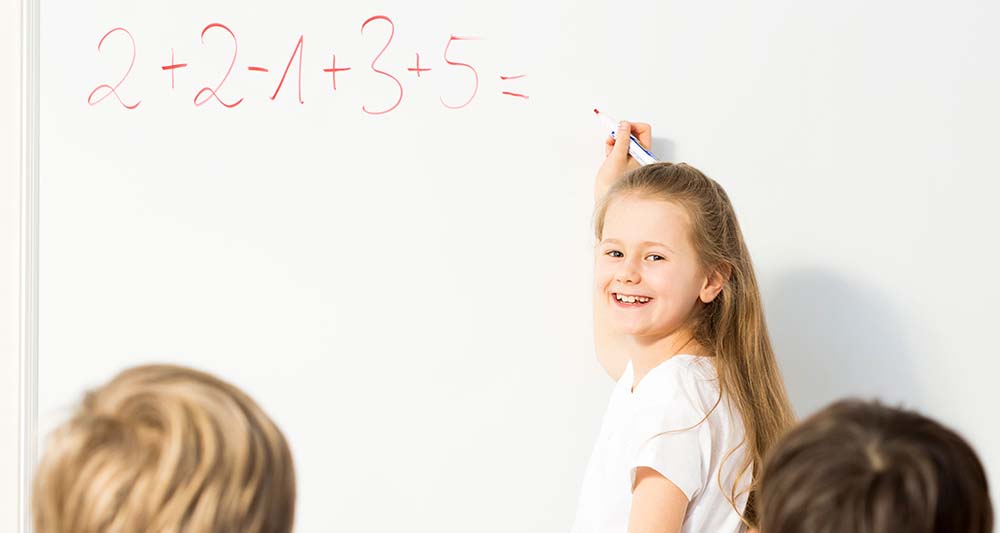Why Students Find Math Difficult and How to Overcome the Fear of This Subject
Many bright students, who perform rather well in other subjects, have difficulty coping with Math. They have a good sense of logical understanding and numeracy skills, but still struggle to apply the same when the class teacher presents them with quizzes and tests to assess their Math skills.
A poor test score demotivates the child further and the child develops a sense of fear towards this dreaded subject. Children lose interest and skip completing homework assignments, rather than paying more attention to fractions and decimal points taught in class.
There are many reasons as to why the child may not like Math and not be able to cope with it in school. From being demotivated, to developing Math anxiety, or even not getting enough scope to practice mathematical operations in school & at home, may be some of the reasons. Sometimes, the lag in the subject may be recognized due to a learning disability that the child is undergoing.
Let us understand some of the reasons behind lack of enthusiasm for Math, so that we as educators and parents are better equipped to guide the child and change his perspective towards the subject.
Ineffective Teaching Methods
Teachers may be using obsolete teaching methods which do not interest the child. Teaching formulas by rote learning technique is not ideal and the child may get bored soon. The pace of teaching the steps to a math equation may also be inappropriate sometimes. Going too fast will confuse the child, but going too slow is equally ineffective.
Insufficient Time for Practice
Just by learning Math concepts in School is not sufficient. Children need to constantly practice Math lessons even at home. Unlike Science there is no fixed definition or solution for Math which can be remembered word to word and then reproduce. Math is all about understanding, reasoning and applying concepts to different problems. Without practice the concept might be forgotten. Only when the steps are systematically followed one can arrive at a correct answer. Hence, practice is the key.
Attention Deficit Hyperactivity Disorder (ADHD)
Does your child often get a remark in his diary which says ‘not paying attention in class? Well, this may be an alarming call to get your child examined for ADHD. Children suffering from ADHD may not be able to ‘focus’ in class and therefore have a tough time grasping Math concepts. They may skip steps while trying to solve an equation and arrive at an incorrect answer. There could be scribbled marks all over the examination paper. The child may even sometimes not take time to read the Question correctly and hurry out to solve the problem thereby using an incorrect formula. Ensure that the child gets extra help after school and try to keep his spirits high.
Child is identified with Dyscalculla
Dyscalculla is a learning disorder which affects the child’s ability to solve mathematical problems. The child takes time to identify the relationship between numbers and apply correct rules of math. Even performing simple addition and subtraction of single digit numbers mentally becomes difficult. Not having a grasp of the foundation creates stress for the learner when he is presented with more complex calculations in middle school. However, do not get disheartened. Go slow in teaching and support your child with appropriate Math aids to improve the performance.
Few Tips to help the Math Learners develop interest in the subject
Make Math Fun
Make use of colorful objects, interesting shapes and introduce a Math role model character to children so that they are intrigued to learn more. Every week, dedicate one session to play Math games and have a competition amongst classmates. Parents can assign a ‘budget’ to children and encourage them to make a report of their spending. Going for a drive? Ask your teens to calculate distance, speed, and mileage. To captivate learning, Mathletics presents fun videos and unique printables to engage the students through gamified lesson plans. The modern way of learning Math is as simple as – Learn -> Play -> Review. Get your hands on the Mathletics subscription all over Dubai, UAE, GCC and the Middle East.

Pair them up to participate in Problem-Solving
The emphasis of Math must not be on getting the right answer. More than the answer being important, it is the correct problem-solving techniques that one needs to adopt. Pair the learners and let each have a Math buddy. Assign problems to them and allow them to device strategies to arrive at an answer. You will be amazed at how children use their creativity to arrive at the solution by using different Math techniques keeping the core concept in mind.
Let Students learn at their own Pace
It is unfair to expect all students in the class to learn at similar speed. Some students have greater logical reasoning power and therefore are great at Math. Some may be brilliant in other subjects, but be averse towards problem solving. Understand that each child is gifted with a different skill set and hence expecting everyone to be Math Wizards in not right.
We are in this together! Let us change our perspective towards humble Math and encourage the future-generation to be savvy with problem-solving techniques.







Recent Comments